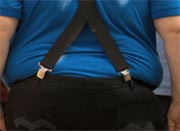
THURSDAY, March 15 (HealthDay News) — An electronic diary program helped improve overweight and obese adults’ adherence to a weight-loss regimen, according to a new study.
The study included 210 overweight or obese adults who were asked to keep track of aspects of weight-loss treatment such as attendance at group sessions and energy and exercise goals.
The participants kept track using either a paper diary, a personal digital assistant (PDA) without feedback, or a PDA with a program that provided personalized dietary and exercise feedback messages.
The participants who received the feedback messages (one per day on diet and one every other day on exercise) were more successful in attending group sessions, meeting daily calorie goals, meeting daily fat-intake goals, reaching weekly exercise goals and monitoring their eating and exercise.
After six months, people in the group that received feedback messages saw weight loss of more than 5 percent. After 24 months, however, weight loss was similar in all three groups, according to the study, which is scheduled to be presented Thursday at an American Heart Association (AHA) meeting in San Diego.
“The results suggest that using an electronic diary improves treatment adherence,” study author Lora Burke, a professor of nursing and epidemiology at the University of Pittsburgh in Pennsylvania, said in an AHA news release.
“Over time, participants’ adherence declined, particularly in the later phase as contact frequency declined and subsequently ended,” she said. “Adherence in the paper-diary group declined more than in the device groups.”
Because this study was presented at a medical meeting, the data and conclusions should be viewed as preliminary until published in a peer-reviewed journal.
More information
The U.S. National Institute of Diabetes and Digestive and Kidney Diseases has more about weight loss.

